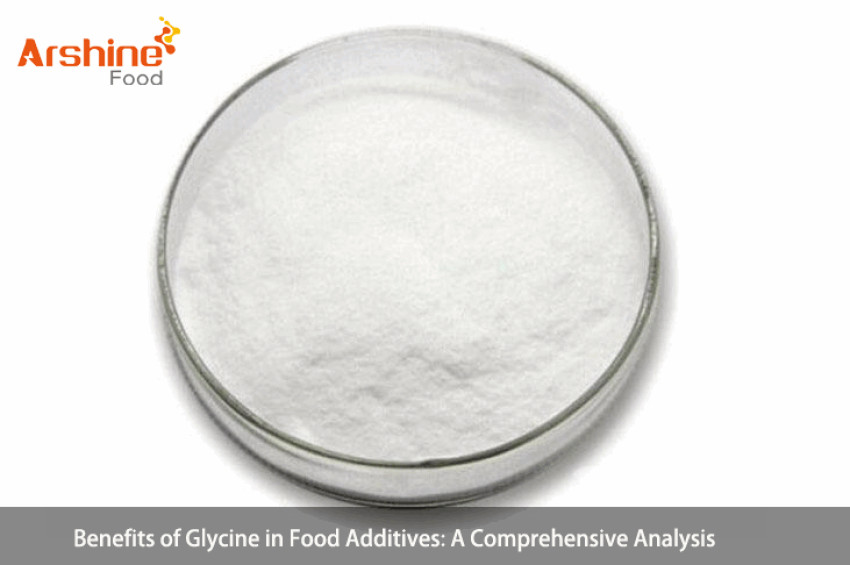
Introduction:In recent years, the food industry has witnessed a growing interest in using natural and functional ingredients in food additives. Glycine, an amino acid with versatile properties, has emerged as a promising additive, offering a wide range of benefits for both food manufacturers and consumers. This text aims to provide a comprehensive analysis of the advantages of glycine as a food additive, its diverse applications, and its role in enhancing the nutritional value and quality of various food products.
1. Understanding Glycine:Glycine, chemically known as aminoacetic acid, is the smallest and simplest of all amino acids. It is a non-essential amino acid, meaning it can be synthesized by the human body. Despite its endogenous production, glycine's supplementation in food additives has garnered attention due to its multifaceted advantages.
2. Nutritional Benefits of Glycine:2.1. Protein Synthesis: Glycine is a critical component in the synthesis of proteins, the building blocks of the human body. By incorporating glycine into food products, manufacturers can enhance their protein content, making them more nutritious and beneficial for consumers, especially those seeking to meet their protein intake goals.
2.2. Collagen Production: Glycine plays a pivotal role in collagen synthesis, a structural protein responsible for the integrity of various tissues, including skin, bones, and cartilage. Foods enriched with glycine can aid in promoting skin health and supporting joint function.
2.3. Neurotransmitter Regulation: Glycine acts as an inhibitory neurotransmitter in the central nervous system. It helps regulate nerve impulses, promoting calmness and relaxation. Including glycine in food additives may contribute to reducing stress and improving overall mental well-being.
2.4. Antioxidant Properties: Glycine possesses antioxidant properties, protecting cells from oxidative damage caused by free radicals. This can help enhance the body's defense against various diseases and support overall health.
3. Flavor Enhancement:3.1. Sweetness Modulation: Glycine has a slightly sweet taste, although it is less intense than traditional sweeteners. As a food additive, glycine can be used to modify the sweetness of products, allowing manufacturers to reduce sugar content while maintaining a desirable taste.
3.2. Umami Enhancement: Umami, the fifth basic taste, is associated with savory and meaty flavors. Glycine enhances the umami taste, making it an ideal ingredient for savory food products such as soups, sauces, and meat-based dishes.
4. Texture Improvement:4.1. Binding Agent: Glycine's unique properties as a binder can be valuable in food product development. It helps improve the texture and cohesiveness of various food formulations, leading to better-formed products that resist crumbling and retain their shape.
4.2. Solubility Enhancement: Glycine is highly soluble in water, making it an excellent choice for improving the solubility of certain food additives and supplements. This solubility attribute can also enhance the texture and mouthfeel of beverages.
5. Applications of Glycine in Food Additives:5.1. Sports and Nutritional Supplements: Glycine is a popular additive in sports nutrition products due to its role in promoting muscle growth and recovery. It is commonly found in protein powders, amino acid blends, and energy drinks, catering to fitness enthusiasts and athletes.
5.2. Bakery Products: In the baking industry, glycine can be used to enhance the texture and shelf life of baked goods. Its binding properties contribute to the proper structure of dough, resulting in softer and more desirable products.
5.3. Meat and Poultry Products: Glycine finds application in processed meat and poultry products to improve their tenderness and juiciness. It also helps reduce the formation of harmful compounds during cooking, ensuring safer consumption.
5.4. Dairy and Plant-Based Alternatives: Glycine can be incorporated into dairy products and plant-based alternatives to enhance their nutritional value and improve taste and texture.
6. Regulatory Considerations:As with any food additive, the use of glycine is subject to regulatory guidelines set by various food authorities. Manufacturers must comply with approved dosage levels and ensure adherence to food safety regulations to guarantee consumer safety.
Conclusion:Glycine's diverse benefits as a food additive make it a valuable ingredient in the food industry. From improving nutritional content to enhancing flavor and texture, its multifunctional properties have contributed to the development of healthier and more appealing food products. As consumer demand for natural and functional ingredients continues to rise, glycine's role in food additives is poised to grow, driving food innovation and offering enhanced nutrition for consumers worldwide.
https://www.arshinefood.com/Industry-information/benefits-of-glycine-in-food-additives-a-comprehensive-analysis




